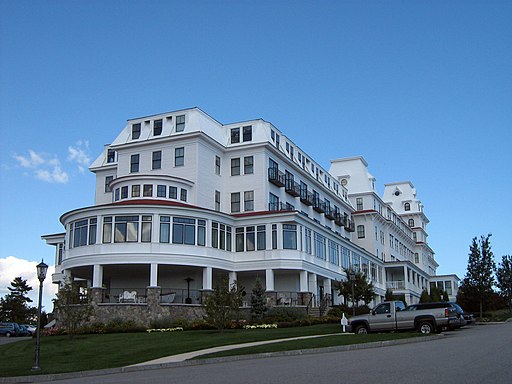
“Since 1874, Wentworth by the Sea has stood as a beacon of elegance among the grand Portsmouth, New Hampshire, hotels that once graced the coastline,” boasts the Historic Hotels website. “The waterfront enclave boasts an illustrious history, having hosted social, business, and political leaders from around the globe.”
“Illustrious history” indeed. James Barker Smith, who purchased the historic hotel in New Castle in 1946, enforced a policy of refusing service and employment to African Americans. “Nor were Jews, Greeks, or other minorities welcome as guests,” according to Mark Sammons and Valerie Cunningham, authors of Black Portsmouth.
The Wentworth wasn’t alone; racial discrimination was common in the world of high-end resorts. “In their heyday, the grand hotels catered to fashionable upper-class tourists who sought exclusivity, ambiance, indoor and outdoor entertainments, and the chance to be seen and admired. Guests of other ethnicities, religions, and backgrounds therefore, were not welcome to mix with the wealthy, white, Christian guests who frequented the hotels,” according to the Museum of the White Mountains. According to a 1964 article published by the Jewish Telegraph Agency, Jews were still barred from 56% of hotels in Maine, Vermont, and New Hampshire in 1957.
The Wentworth’s policy was not a casual one. In fact, the man Smith bought the hotel from, Harry Beckwith, contracted with an agency that checked the ethnic and religious background of would-be guests before taking their reservations. Smith was carrying on the tradition.
Nor was the policy a secret. Due to its prominence, the historic hotel became the target of local civil rights activists. Their act of strategic defiance made history.
Two days after President Lyndon Johnson signed the 1964 Civil Rights Act, which prohibited racial discrimination in public accommodations such as hotels and restaurants, members of the local NAACP initiated their strategic plan of action. That it was the Fourth of July was no coincidence.
As Sammons and Cunningham tell the story, university professor Hugh Potter and his wife, Jean, a White couple who lived in New Castle, made 7 PM reservations for “a party of four in the dining room” and paid in advance. “It was to be a major gala evening, to be hosted by the owner, himself, and proved to be a full house,” Jean Potter later recalled. When the Potters had arrived first, as planned, for their dinner reservation, they were joined by a Black couple, Emerson and Jane Reed, lifetime residents of the area. Emerson Reed also chaired the NAACP’s Legal Redress Committee. Meanwhile, The Rev. John and Betty Papendrew, another local white couple, had made their own reservations and were in place as observers for the NAACP.
After the Reeds resisted Smith’s anticipated instruction for them to eat in the kitchen, the owner argued it out in his office with Hugh Potter and Emerson Reed. Smith told them how much money he would lose if he served Black customers. Potter and Reed argued morality and law. After a long and heated debate, and Potter’s display of his receipt, the four diners were finally seated at the only open table. “The irony was that — beside our table on a large serving table — was the American flag, designed out of dinner mints,” recalls Jean Potter. “And guests had been encouraged to see it and help themselves. So we were not overlooked!”
“The following week,” write Sammons and Cunningham, “a different foursome from the NAACP, including a Black officer from Pease Air Force Base, repeated the whole process at the Wentworth and were seated without delay. Eventually the Wentworth-by-the-Sea employed Black people, too.”
“For a time the Smiths also owned the Rockingham Hotel in Portsmouth and followed the same policies there, writes J. Dennis Robinson, author of Wentworth by the Sea: the Life and Times of a Grand Hotel. “In 1948 local filmmaker Louis de Rochemont produced one of the first major motion pictures to deal with the issue of race. De Rochemont shot part of the film ‘Lost Boundaries’ in the Seacoast using Black cast members and set up his operation at the Rockingham. When Jim Smith refused to let the Black cast members eat in that dining room, de Rochemont threatened to spend his money at another hotel, and Smith relented.”
Read more in Black Portsmouth: Three Centuries of African-American Heritage by Mark J. Sammons and Valerie Cunningham (UNH Press, 2004).

